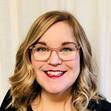Amy Sue Nathan's Blog: Women's Fiction Writers, page 38
June 26, 2013
Author JoeAnn Hart Embraces Her Inner Earth Goddess In Her Fiction
I love all the interviews and guest posts on Women’s Fiction Writers, but sometimes I feel like a hoarder. Just hanging onto all the good stuff until…it’s time to share. And that’s how I feel about JoeAnn Hart’s post today. Reading this made me think about more than women’s fiction as a genre (or not, that’s not really an argument here) and about more than whether I’m a plotter or a pantser. As I embark on next part of writing my now-unnamed second novel, I have to, I must, remember what is most important to my characters. What matters to them? What do they want to change outside themselves that will impact their inner selves? What drives them besides themselves? It’s fiction. It can be ANYTHING!
Please welcome JoeAnn Hart to Women’s Fiction Writers!
Amy xo
Author JoeAnn Hart Embraces Her Inner Earth Goddess In Her Fiction
 With the Summer Solistice just passed, it’s a good time to revisit the Earth Goddess and her literary legacy. In sync with the first Earth Day in 1970, when I was an impressionable 14 year-old, women were throwing off the shackles of patriarchy in the streets and in their homes, even in churches, chucking out any male god who lived on a cloud. Many turned to the Old Religion, governed by the Goddess, who once reigned over a peaceful, matrilineal world in harmony with Nature. Then, according to legend, the priests came, driving her and her followers underground where they were called witches, and thus began civilization’s slide into constant war and ecological devastation.
With the Summer Solistice just passed, it’s a good time to revisit the Earth Goddess and her literary legacy. In sync with the first Earth Day in 1970, when I was an impressionable 14 year-old, women were throwing off the shackles of patriarchy in the streets and in their homes, even in churches, chucking out any male god who lived on a cloud. Many turned to the Old Religion, governed by the Goddess, who once reigned over a peaceful, matrilineal world in harmony with Nature. Then, according to legend, the priests came, driving her and her followers underground where they were called witches, and thus began civilization’s slide into constant war and ecological devastation.
Women writers of the 70’s and early 80’s incorporated this mythopoeic vision into their novels, and I read them all. Marge Piercy, in Woman on the Edge of Time, wrote about an ideal society based on the assumed female principles of peace and love of the earth, set against a cautionary tale of continued male domination and its attendant disregard for the planet. In The Handmaid’s Tale, Margaret Atwood created a dystopia of sexism and violence after men become infertile by a toxic event of their own making. Other writers contemplated the past instead of the future. Marion Zimmer Bradley retold the King Arthur myth from Morgan le Fay’s point of view in The Mists of Avalon, making the goddess worshipper the heroine and not the villain. Jean Auel, in Clan of the Cave Bear, placed the goddess plunk in the center of the Stone Age.
By the mid-80’s, as women put on their shoulder pads and floppy ties and went to the office, feminism began to pull away from the Earth Goddess. Flouting one’s fertility and innate peaceful nature at the office was not going to break any glass ceilings. The focus had turned to job equality and pay equity, so academic and political interests set out to prove there were no differences between the genders. And rightly so. It’s a small step from archetype to stereotype.
But I believe there’s still a place for the goddess and her reverence for the earth in fiction, perhaps now more than ever. As individuals we recycle and consider our carbon footprints, so why not ask the same of our characters? In my novel, Float, the protagonist goes to the beach to examine some mysterious words in the sand and ends up rescuing a seagull strangled by a plastic six-pack holder. This sets off a series of events that leads to a search for a true biodegradable plastic. I hadn’t intended for my character to get so environmentally involved, but just the act of having him notice the plastic was enough to move the plot in that direction.
Some writers may be afraid of opening up the Pandora’s Box of climate change or toxic waste because they don’t know what can be done about it. But fiction does not have to provide the answers, as Chekov said, it only has to ask the right questions. Let’s celebrate the Solistice by incorporating a little Goddess into our writing, and let our characters start asking a few pointed questions about the mess around them.
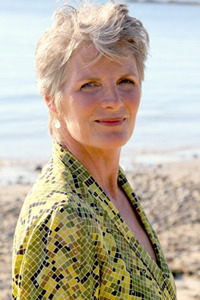
Photo credit: Brendan Pike
JoeAnn Hart lives in Gloucester, Massachusetts, America’s oldest seaport, where fishing regulations, the health of the ocean, and the natural beauty of the world are the daily topics of wonder and concern. She is the author of the novel Addled (Little, Brown, 2007) a social satire that intertwines animal rights with the politics of food.
JoeAnn’s essays, articles, and short fiction have appeared in a wide variety of literary journals and national publications, and she is a regular contributor to the Boston Globe Magazine. Her work has won a number of awards, including the PEN New England Discovery Award in Fiction. She and her husband tend a few farm animals, including two donkeys from Save Your Ass Rescue. In fair weather, Hart rows a dory around the harbor.
Float was a finalist for the Dana Award in the Novel, and the first two chapters, slightly modified, won the Doug Fir Fiction Award for a short story relating to environmental issues.


June 20, 2013
Guest Post: Author Marybeth Whalen Reflects On How Someday Is NOW
I’m honored to introduce Marybeth Whalen to the Women’s Fiction Writers community! Marybeth is a She Reads co-founder and a very wise writer-friend. It’s easy to look at published authors and forget that they (we) did not enter this world with a novel tucked into our bunting. Every author with a published novel was once—wait for it—an aspiring author without one. Sometimes, at least for me, it’s reassuring to remember that. Yes, even with The Glass Wives out in the world, I’ve found one of the most helpful things is to remember that the process, the journey, the striving, never ends. Oh, and that means the angst never ends either. So when Marybeth sent me this guest post, I knew it was the right fit for Women’s Fiction Writers, and for me.
Marybeth is quite clear, moving forward in this writing life is not always easy—but it’s always worth it.
Please welcome Marybeth Whalen to Women’s Fiction Writers!
Amy xo
Author Marybeth Whalen Reflects On How Someday Is Now
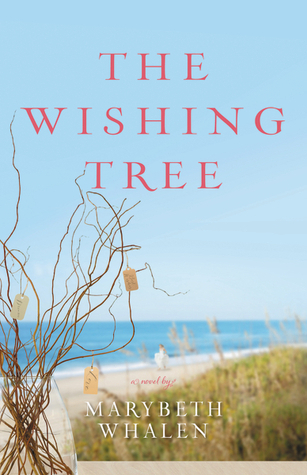 There have been several surreal moments on my way to holding my first novel. Sharing it with an author I respected so much I got tongue tied. Pausing outside a Barnes and Noble with my publisher as she wrapped her arm around me and told me that a year from that moment my book would be on its shelves. Receiving endorsements from other authors and realizing they had actually read it, then shrugging off the urge to throw up with that thought. Discussing it with my husband in detail after he read it, and reveling in all his questions. Hearing about the marketing campaign on a conference call with public relations professionals.
There have been several surreal moments on my way to holding my first novel. Sharing it with an author I respected so much I got tongue tied. Pausing outside a Barnes and Noble with my publisher as she wrapped her arm around me and told me that a year from that moment my book would be on its shelves. Receiving endorsements from other authors and realizing they had actually read it, then shrugging off the urge to throw up with that thought. Discussing it with my husband in detail after he read it, and reveling in all his questions. Hearing about the marketing campaign on a conference call with public relations professionals.
Because the truth is, I am not a person who does such things. I prefer my jammies to most any other article of clothing. I like hiding out at home and typing thoughts into my computer… but am not sure those thoughts should be displayed for others to read. I dreamed of being a novelist all my life, but really doing it? That seemed like a dream for someone else. At any rate, a dream for someday and not now. I hid behind someday for a long time because someday was safe. The word someday was a promise I didn’t have to fulfill, a risk I didn’t have to take… yet. I could put it off for as long as I wanted, yet still hold onto my dream.
I would have hidden behind someday for the rest of my life if not for someone in my life who stopped letting me hide. One by one she plucked out all the excuses I had to offer and urged me towards “now” instead of “someday.” She held me accountable. She accepted no substitutes. She urged me forward and didn’t let me languish on the corner of Self Pity and Apathy. She was my friend while being my taskmaster—continually refocusing my vision on the end result, admonishing me to keep my eye on the prize, even when I doubted that a prize awaited.
When I met my friend Ariel, she was already pursuing the dream of becoming a novelist. She had already done the hard work of writing a novel and was in the process of finding a publisher while I was afraid to even write the first word. What if it was wasted? What if I failed? I would rather not try at all, than fail and know my dream was out of reach. If I never tried then I would never know. And yet, if I never tried I would never know. How could I stand to live in that dream limbo, Ariel wanted to know? Just do it, she urged me. “If I can, you can,” was her refrain. When I look back on it, I see how much I needed her prodding, her unrelenting pep talks. It was the difference between someday and now.
Someday is safe. There is no doubt about that. But someday is also boring. I am grateful for that person in my life who stopped letting me hide behind someday and whispered “Now.” An exciting adventure waited within that three letter word. I hope that this post will serve as that voice in your ear, nudging you away from the safety of someday and into the adventure that awaits.
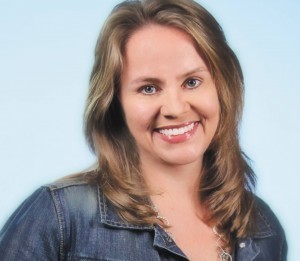 Marybeth Whalen is the wife of Curt and mom of six children, ages college to elementary. The family lives in Charlotte NC. Marybeth spends most of her time in the grocery store but occasionally escapes long enough to scribble some words. Her most recent novel is THE WISHING TREE, was published June 4, 2013. Marybeth is the founder of She Reads, www.shereads.org, a site devoted to spotlighting the best in women’s fiction, and believes that story is the shortest distance to the human heart.
Marybeth Whalen is the wife of Curt and mom of six children, ages college to elementary. The family lives in Charlotte NC. Marybeth spends most of her time in the grocery store but occasionally escapes long enough to scribble some words. Her most recent novel is THE WISHING TREE, was published June 4, 2013. Marybeth is the founder of She Reads, www.shereads.org, a site devoted to spotlighting the best in women’s fiction, and believes that story is the shortest distance to the human heart.


June 12, 2013
Author Laura Drake Likes Cowboys And Motorcycles, And Loves Writing A Good Story
I’m getting this post ready to go live on Women’s Fiction Writers and it’s strange for me because it’s the middle of the day. Why is that strange? Because for a few years now I’ve worked with and corresponded with Laura Drake, and it always seems to happen, oh, around five in the morning. It’s always nice to know someone else is awake and in front of their monitor when everyone else is sleeping!
Laura is tireless in her work to promote women’s fiction, evidenced by her involvement in RWA-WF before becoming part of the Founding Team of the Women’s Fiction Writers Association. What??? You don’t know about the WFWA? It’s a brand new, totally officially official organization on the cusp of being able to open up to members. There’s a link below so you can find out more information. I know that for me it’s an invaluable resource as well as a place I can always find a friend.
Now back to Laura. Laura’s a powerhouse author with a three-book deal, a penchant for motorcycles, a keen wit, and a real understanding of what it means to be supportive of other writers.
Please welcome Laura Drake to Women’s Fiction Writers!
Amy xo
Author Laura Drake Likes Cowboys And Motorcycles, And Loves On Writing A Good Story
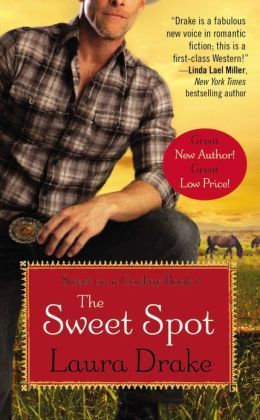 Amy: Laura, you went from aspiring author (and a million other things, including motorcycle chick) to author with a three-book-deal starting with THE SWEET SPOT which was released on May 28!! Can you tell us a little about that?
Amy: Laura, you went from aspiring author (and a million other things, including motorcycle chick) to author with a three-book-deal starting with THE SWEET SPOT which was released on May 28!! Can you tell us a little about that?
Laura: It took me three novels, and fifteen years to sell. I think it’s kind of like that sale at Nordstrom’s…you pass up a blouse, but you decide, when another woman picks it up, the perfect one!
No one wanted my first two books until the third one sold. Then they wanted everything I’d written. I had the three book deal with Grand Central, and a one book deal with Harlequin’s Superromance.
Amy: How did your books change through the editing process? Was this hard for you? (I know that my book went through a big change, sometimes I resisted, but in general, the changes were on target and made it a better book!)
Laura: Well, The Sweet Spot had more changes than most, because it was written as WF, and sold as romance. The good news was it was close to the line (1/2 the editors believed it to be WF, the other 1/2, romance.)
The changes were mainly a matter of focus; changing the woman’s journey to include more of the hero’s journey. And advance the romance a bit. That was hardest to do, because my couple had divorced following the death of their son. Charla was addicted to Valium, and JB’s drug of choice was young and blonde. They had a long way to go to get back to each other. It took hours of angst and sweat, but it worked out in the end!
Amy: What’s your favorite part of the writing and publishing process?
Laura: I love the end. Not because I’m done, but because I’ve lived with the characters for nine months, and it’s so rewarding to give them their satisfying ending after torturing themthe whole book (I’m so evil.)
Believe it or not, so far, I love the promo! I’m an extrovert, and I love talking books and writing, so interviews, blogs, etc. are right up my alley!
In person is tougher. I spoke to a women’s group for the first time last week – I was terrified the day before, but when I actually did it, I had a great time!
Amy: How do you see social media in your writing life? Is it work, play, or both?
Laura: It’s a complete party for me. See, I’m lucky. I write about specific subjects (so far, anyway) Professional Bull Riding, and motorcycling (yes, I know, I’m odd.) It makes it easier to find my target audience.
I so love Twitter – all my peeps are there: writers, biker-chicks, bull riders, fans, I even follow a couple of very opinionated bulls!
Amy: You obviously know that the term women’s fiction sometimes gets a bad rap. Yet, there’s the new Women’s Fiction Writers Association which is primed to embrace the term and its authors (just like this blog does). What is your own definition of women’s fiction and what’s your take on the conflict?
Laura: And thank you, Amy, for what you do for WF writers and readers. It’s so nice to find a quiet corner out of the fray!
I’m from the Rodney King, can’t-we-all-just-get-along, school. I love the new group because their mission is: An Inclusive Organization of Writers who create stories about a woman’s emotional journey.
That’s what Women’s Fiction is to me. I don’t understand getting our collective panties in a twist about a label. What’s important is the story!
Amy: What’s your best advice for aspiring authors of women’s fiction (other than to join WFWA, the new Women’s Fiction Writers Association)?
Don’t waste time on things you can’t control, or what will happen, five steps down the road. I lost focus with all that distraction. Focus on your craft, and writing a great book. After all, Isn’t that why we chose to write to begin with?
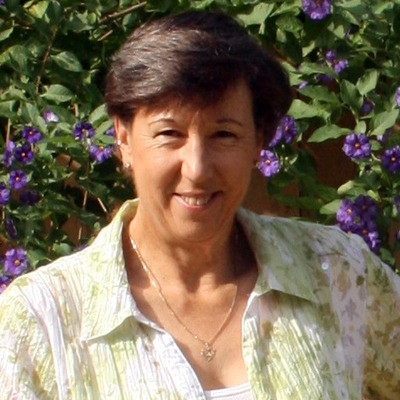 Laura Drake is a city girl, who never grew out of her tomboy ways, or a serious cowboy crush. She writes both Women’s Fiction and Romance. The Sweet Spot, the first novel in her, ‘Sweet on a Cowboy’ Series, will be released by Grand Central in May of 2013, Nothing Sweeter, in December. Her ‘biker-chick’ novel, Her Road Home, will be released by Harlequin’s Superromance in August, 2013.
Laura Drake is a city girl, who never grew out of her tomboy ways, or a serious cowboy crush. She writes both Women’s Fiction and Romance. The Sweet Spot, the first novel in her, ‘Sweet on a Cowboy’ Series, will be released by Grand Central in May of 2013, Nothing Sweeter, in December. Her ‘biker-chick’ novel, Her Road Home, will be released by Harlequin’s Superromance in August, 2013.
Laura resides in Southern California, though she aspires to retirement in Texas. She gave up the corporate CFO gig to write, full time. She’s a wife, grandmother, and motorcycle chick in the remaining waking hours.
Website: http://LauraDrakeBooks.com
Twitter: @PBRWriter
Blog: http://WritersintheStorm@Wordpress.com


June 10, 2013
Debut Author Marci Nault Talks About Learning Patience, Dreaming Big, And Writing Women’s Fiction
I’m happy to welcome Marci Nault to Women’s Fiction Writers today! Marci reached out to me months and months ago as a fellow debut women’s fiction author. She’s kind, supportive, and looks great on camera (you can see a video below).
Marci is woman with a mission to make her life meaningful and live her dreams!
Please welcome Marci Nault to WFW!
Amy xo
Debut Author Marci Nault Talks About Learning Patience, Dreaming Big, And Writing Women’s Fiction
 Amy: I know you are fulfilling a dream by having The Lake House published! When did becoming a published author become something you wanted to do?
Amy: I know you are fulfilling a dream by having The Lake House published! When did becoming a published author become something you wanted to do?
Marci: When I was a small child my mother had to return to work. I desperately missed her, so to soothe my heart we sat down and she read my favorite stories into a tape recorder. Maybe this is why books have always given me comfort and peace. I began to love writing when I was nine and I spent hours creating stories out in the woods, but I never believed I was good enough to publish.
In my early twenties, while doing motivational speaking, I became involved in the publishing business. The first time I entered the halls of Book Expo America and saw the big publishers, the desire to write became overwhelming but the fear even greater. At the time I was involved in non-fiction, but I always believed fiction was more powerful. (Stories cut straight to the heart of emotions and allow the reader to experience through their imagination what they need to feel instead of what the writer decides the journey should be.) It took me ten years after that first trip to BEA to face my fear and decide to pursue my dream of becoming a novelist.
Amy: Is the theme of dream fulfillment prevalent in your story?
Marci: The Lake House is more about family and finding home in the most unlikely of places. As I’ve been interviewed during publication, I’ve realized that the theme of pursuing dreams is also prevalent. Seventy-four-year-old, Victoria, has returned to her childhood home to face the regrets of her life and what she left behind. There are times when she wonders if pursuing her dreams was a mistake simply because it cost her so many years with the people she loved. Twenty-eight-year-old, Heather Bregman, is determined to succeed as a travel writer because she believes by fulfilling her dream she can find safety.
I wrote the base of this story before I began pursuing my list of 101 Dreams Come True, but now I see that I was exploring the need and fear within myself. I was terrified that if I pursued my dreams I would lose the people I loved and so I tried to stuff myself into the life I thought I should live – not so unlike what Victoria would’ve done had she not pursued her dreams.
Amy: Where were you when the idea for the THE LAKE HOUSE “hit” you?
Marci: I had a nighttime dream that I found my perfect home on a lake in Massachusetts and I bought it without doing any research. When I moved in everyone was over the age of seventy and they were trying to set me up with their grandsons and interfere in my life. When I woke I knew I had to write the story.
Amy: Do you have a plan when you sit down to write, or do you just “wing it?”
Marci: Most of the time I have a plan. When a story grabs me, I have no choice but to write non-stop. The story consumes me and I’ll write for weeks and months forgoing all other activities. Friends will call or come over just to be certain I’ve eaten. I’m trying to change this habit and get on a more structured schedule, but I’m not certain it’s in my personality. I tend to go full-tilt and then crash and recuperate. I wouldn’t suggest this approach.
What I do love is when I go for walks with my characters. It’s a wonderful way to find my writing. I live along a river and I’ll take the bike trail and simply listen to my characters living out their lives in my head. By the time I return I’m so filled with ideas that I have to write.
Amy: The term women’s fiction comes under fire sometimes, how do you feel about it? What is your definition of women’s fiction?
Marci: When I originally saw this question I realized I didn’t think much about the term. I tend to ignore negativity and focus on the positive. Now that my book has been published the negative connotation has been in my face.
First of all, I’ve realized that when you say you’re a writer of women’s fiction people tend to respond, “Will Fabio be on your cover?” Mostly this comment comes with a chuckle from men. I’ve also noticed that we don’t call it “male” fiction when we’re discussing James Patterson or Michael Connelly.
When a reviewer loved my book but said it was in parts too “steamy” (this shocked the heck out of me) the comments on social media came back, “Well isn’t that what chick-lit is all about?” My response was that not all women’s fiction has intimate scenes.
So what can be done? I’m a big supporter of women being women and being proud of it. Equality shouldn’t mean that we have to act like men in order to be taken seriously. I’m proud to say that I write women’s fiction. I’m part of an incredible group of women who know how to write emotion, life and all its beauty and ugliness into an unforgettable story. So we band together, proud of what we do and love to read. We don’t try to be like the men, but instead raise the awareness of the incredible literature that we produce.
Amy: What’s your best advice for aspiring authors of women’s fiction?
Marci: When I was a young girl my mother always told me that I needed to learn to have patience. I didn’t understand the point. Patience was for people who were willing to sit around and let life pass them by. I think the lesson came in spades on my journey to publication. It takes tremendous patience and hard work to be in this business. Sometimes that patience is walking away from a story for weeks or even a month so that you can come back with fresh eyes. Too many aspiring authors rush to query agents long before the story is ready. Revise, get critiques (professional if possible), revise again, and then step away before reading it one last time.
Writers have to dream big in order to keep going when working on a novel, waiting for an agent to return emails, sitting by the phone during submission, and at so many other moments in careers. But the sooner a writer focuses on the reality of the business of writing: craft, publicity and marketing; what they can do to promote and build their brand and platform; what to expect and what their goals are – the sooner they’ll be on the path to publication. Start with the dream, see the reality, and then go for the goal.
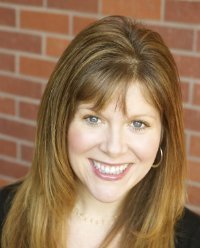 Marci Nault hails from a town not too far from Lake Nagog in Massachusetts. Today she can be found figure skating, salsa dancing, hiking and wine tasting around her home in California. Marci is the founder of 101 Dreams Come True, a motivational website that encourages visitors to follow their improbable dreams. Her story about attempting to complete 101 of her biggest dreams has been featured in newspapers and magazines nationwide, and she regularly speaks on the subject on radio stations in both the United States and Canada.
Marci Nault hails from a town not too far from Lake Nagog in Massachusetts. Today she can be found figure skating, salsa dancing, hiking and wine tasting around her home in California. Marci is the founder of 101 Dreams Come True, a motivational website that encourages visitors to follow their improbable dreams. Her story about attempting to complete 101 of her biggest dreams has been featured in newspapers and magazines nationwide, and she regularly speaks on the subject on radio stations in both the United States and Canada.
Marci is also a partner in the online bridal boutique http://www.ElegantBridalDesigns.com where she’s surrounded by couture shoes, purses, clothing, and accessories, which isn’t a bad deal at all.
For more information about THE LAKE HOUSE and Marci’s dream list check out http://www.chicklitcentral.com on June 20th where I hear they’ll be doing a giveaway.


June 5, 2013
Guest Post: Three Ways Authors Can Put Jealousy To Work! By Jennie Nash
There’s a lot to think about in the guest post below. Author Jennie Nash lays it on the line. She’s jealous and she’s not afraid to say so, or to use that to her advantage. Whether you find yourself jealous of your colleagues or not, there are some wise words below for writers to motivate themselves to keep on keepin’ on, no matter what.
In my case, I searched my soul and psyche and can tell you that I’m not jealous of anyone’s writing or publishing success. I’m jealous of people who can eat a whole cake and not gain weight. I’m jealous of nice rich people (not so much the mean ones). But writers? Nope. Not now anyway. But I do see Jennie’s points and how we can be pushed to better ourselves when someone is doing what we aspire to do, or has what we (think we) want.
Please welcome Jennie Nash to Women’s Fiction Writers!
Amy xo
P.S. Don’t be jealous that Jennie has a guest post on WFW. If you have an idea for a guest post, just email me and we’ll see if it fits. As long as it’s about writing, and non-promotional, I’m happy to consider it for Fall/Winter 2013.
Three Ways Writers Can Put Jealousy to Work
by Jennie Nash
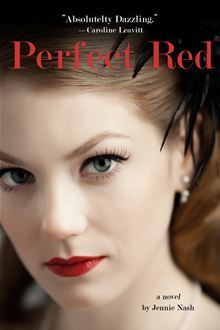 On the front cover of my latest novel – my seventh book – there is a blurb from the great novelist Caroline Leavitt. “Absolutely dazzling,” it says. It’s part of a longer quote that appears on the back of the book, which includes more specific and awesome praise. I have never met Caroline Leavitt, but we are cyber-friends, she is good friends of a writer friend of mine, and she taught in the writing program at UCLA where I teach, which is how I ended up with the killer blurb. Also, Caroline is among the most generous and engaged writers you will ever meet and she’s the kind of super nice person who would read the manuscript of someone she’s never met, and email every few hours to squeal with delight to tell that writer how much fun she’s having with your story. When I received her blurb, I had the highest hopes for my book – and I mean high. Caroline Leavitt herself had recently been on The New York Times bestseller list, boldly switched publishers, landed a juicy deal, and found the kind of career transforming support she needed to keep writing her books — and I wanted to orchestrate a similar move. Caroline Leavitt was my proof that it could be done. She was my North Star.
On the front cover of my latest novel – my seventh book – there is a blurb from the great novelist Caroline Leavitt. “Absolutely dazzling,” it says. It’s part of a longer quote that appears on the back of the book, which includes more specific and awesome praise. I have never met Caroline Leavitt, but we are cyber-friends, she is good friends of a writer friend of mine, and she taught in the writing program at UCLA where I teach, which is how I ended up with the killer blurb. Also, Caroline is among the most generous and engaged writers you will ever meet and she’s the kind of super nice person who would read the manuscript of someone she’s never met, and email every few hours to squeal with delight to tell that writer how much fun she’s having with your story. When I received her blurb, I had the highest hopes for my book – and I mean high. Caroline Leavitt herself had recently been on The New York Times bestseller list, boldly switched publishers, landed a juicy deal, and found the kind of career transforming support she needed to keep writing her books — and I wanted to orchestrate a similar move. Caroline Leavitt was my proof that it could be done. She was my North Star.
I have every reason to love and adore this woman – and yet right now I can’t even read her posts on Facebook without feeling my stomach clench. Every morning when I sit down to my desk to work, Caroline Leavitt mocks me from my favorite industry blog, where her latest novel – Is This Tomorrow – is being touted in a snappy ad. I’m afraid to go into a bookstore because I just know that her book is going to be stacked on the front table, with a charming handwritten note from one of the members of the staff. I’m afraid to talk to our mutual friend because the last time we chatted, I heard that Caroline had sold her next novel to her super supportive awesome publishing house. And my novel? The one Caroline blurbed? It’s not in the bookstore. It’s not on the excellent blog. Unless something remarkable happens that’s out of my control, my book has died on the vine, and meanwhile Caroline Leavitt is stomping on grapes and making jubilant wine.
Do I sound a tad bit jealous? You bet I am and I’m not going to pretend otherwise, and neither, I believe, should you. Jealousy can be good. If handled the right way (which is to say without any damaging public rants, brooding bouts of melancholia, or Soliere-like criminal insanity) it can be like rocket booster fuel for your writing career. Here’s how:
1. Jealousy is a reminder that you’re doing something you care about.
Writing a book is a long, hard, difficult lonely undertaking. Why do it, if you don’t care about it with a fiery passion? It would be far easier and more pleasant to grow heirloom tomatoes or take up paddle boarding. My jealousy proves to me that I’m nowhere near ready to throw in the towel. Oh sure, I went through some weeks of claiming that I was going to quit writing, of claiming that it was just too painful, of claiming that I was done with this fickle business where you can pour out your heart and soul and get nothing but silence in return. But I wasn’t fooling anyone, least of all myself. In The Happiness Project, Gretchen Ruben says that failure is “part of being ambitious; it’s part of being creative.” Jealous, too. So if you’re feeling jealousy of another writer, consider it a good thing. It means you’re found something that matters to you.
2. Jealousy shows you specifically what you want, and specificity is critical in setting and reaching goals.
Every writer needs to constantly be evaluating and setting goals, on both a small scale and a large, and they should ideally be SMART goals (specific, measurable, achievable, relevant and time-bound. Here’s a fast and clear explanation on all that from the human resources department at MIT.) In the beginning of a book’s creation, your goal might be, “Write 3 pages a day.” In the beginning of a career, it might be, “Send out 3 queries a week to agents who represent the kinds of books I write” or, “Blog once a week about my book topic.” In the middle of a career, when you know you can spin a good tale, you know you can do the work required to get it on the page, and you already have a great agent in your corner (which is where I am), things tend to get a little muddy. My jealousy of Caroline Leavitt has helped give me focus. I know more specifically what I want, and I have a clearer idea of what I need to do to get there. What does your jealousy show you about what you want? How can you translate that into action?
3. Jealousy gives you something to prove.
I’m not just staying in the game; I’m staying in it to win. I’ve got a chip on my shoulder. I’ve got something to prove. I am worthy of big juicy support. I can write a novel that lots and lots of readers love. Watch me. And if it doesn’t work? As any good novel proves, a character with a strong motivation is, if nothing else, a character with a good story, so I may not pull it off, but at least it will be an interesting journey.
What about you? What do you have to prove?
 Jennie Nash is a writing coach, whose most recent novel is Perfect Red. She has a special offer on her website for readers of Women’s Fiction Writers – a free sneak peak of her forthcoming book, The Writers’ Guide to Agony and Defeat. Visit her at jennienash.com to check it out and use the password WFW6.
Jennie Nash is a writing coach, whose most recent novel is Perfect Red. She has a special offer on her website for readers of Women’s Fiction Writers – a free sneak peak of her forthcoming book, The Writers’ Guide to Agony and Defeat. Visit her at jennienash.com to check it out and use the password WFW6.


June 3, 2013
Author Caroline Leavitt Talks About Her Characters’ Moral Issues, Working Backward, and Good Karma
This is one of those “why didn’t I think of that” interviews. I love those! Caroline Leavitt is a celebrated best-selling author and a generous soul who loves cowboy boots. Is there a better combination? I think not.
Two things in particular that struck me when interviewing Caroline. No matter how busy she was at the time, she read and answered my questions in record time. And the answers are gooood. Nothing run of the mill. Nothing without thought and meaning. The other thing was Caroline’s mention of karma. It’s true. In the writing world, what goes around comes around. Oh, okay, there were more than two things that stood out in this interview but you’ll have to read the rest for yourself.
Please welcome Caroline Leavitt to Women’s Fiction Writers.
Amy xo
Author Caroline Leavitt Talks About Her Characters’ Moral Issues, Working Backward, and Good Karma
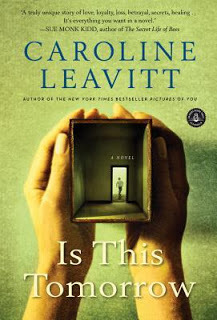 Amy: As a single mom, I am always drawn to stories about single mothers. What drew you to Ava? Where did she “come from?”
Amy: As a single mom, I am always drawn to stories about single mothers. What drew you to Ava? Where did she “come from?”
Caroline: I’m drawn to stories about single mothers, too–and to anyone who is struggling outside of the norm and is determined to make things work. I grew up an outcast in my neighborhood because I was Jewish (it was a Christian neighborhood), smart and sickly, but there was one family that was even more outcast–and that was this divorced mother who had a lot of boyfriends. None of our mothers wanted us anywhere near her or at her house, but she was sort of cool, and I grew to really emphathize with her.
Amy: Is there something specific you hope readers take away from Is This Tomorrow?
Caroline: The book is so much about paranoia and how and what it does to people. There’s some disturbing similarities between my fifties world and today. All you have to do is substitute the word “terrorist” or “Muslim” for “Communist” and you realize that fear of “the other” doesn’t go away. And it should.
Amy: You’re very active on Facebook, talking about writing and life. How does this help or hinder your writing?
Caroline: Oh, it definitely helps. I did most of my research through the contacts I made on Facebook and Twitter. All I had to do was post, “Does anyone know anyone who was a male nurse in the early 60s?” and I had three responses! I was connected up to a pastry chef from the fifties and a cop in the fifties, and those conversations were my favorite in the writing process.
Social media is also my water cooler. I’m so alone during the day when I write, that it makes me feel better if I can stop for just a few moments and connect with someone else. I disagree with people who say that social media is making us less intimate, because I’ve become good friends with so many people–met them outside for lunch, called them on the phone, the whole works!
Amy: I have a feeling I know the answer, but do you have a plan or system for writing your novels?
Caroline: Yep, yep, yep. About five years ago, a student of mine at UCLA loaned me her tapes for John Truby’s story structure classes. He’s a story guru who works out of L.A. primarily with movies, and his structure says the three act structure is not the best way to tell a great story, and neither is traditional screenwriting, with its plot points. He crafts stories on moral points–on what the character’s psychological and moral needs are. I thought my head would explode when I listened to the tapes because it was such an indepth way of telling story. I began to apply it to my novels, and using it, I had my first New York Times best seller. So I map everything out in advance. I have 30 page outlines. Of course, they change all the time as I am writing, but the basic idea of what the character wants and how I am going to get him or her to what he or she needs instead, is always there.
Amy: Or, if we can get more specific, how do you get started when you’re ready to start something brand new?
Caroline: First I figure out what the moral issue is that each character faces. By moral issue, I mean what is stopping them from leading the life they want or deserve, how are they hurting others and themselves? What’s their plan to get what they want and what thwarts them and why, and what are they wrong about at the beginning of the novel that they don’t even realize they are wrong about? I always know the ending, where the character is going to end up, and sometimes I work backwards from that point, almost as if I am unspooling the character. Most of my work is character work.
Then I spend about 6 months on a detailed 30 page outline where I map out the whole story. I show it to three or four other writers and they usually have a million comments about what isn’t working, what doesn’t make sense, and I get back to work on it revising.
When I feel that I have that, I write the all important first chapter. It’s important for me because if I have a good first chapter, then it acts as proof that I can write this book! If the chapter grabs me then I know when I am in the middle of the book and floundering and wondering if I should have gone to dental school instead of be a writer, that this chapter is proof that I am on the right track! Writing that first chapter takes months, but once it’s there, it’s there.
Amy: There’s a lot of scuttlebutt about the term “women’s fiction.” How do you feel about it? And is there a women’s fiction definition you’re comfortable with? (For the record, the term doesn’t bother me, which might be obvious based on the name of this blog!)
Caroline: Oh, I loathe the term women’s fiction and refuse to use it. If anyone asks me to label myself, I call myself a literary writer. Is there a term “men’s fiction?” No, because the implication is that everyone reads what men write, but only women–and a certain kind of woman–would read women’s fiction. And that’s imply not true. I always say that when women write about domestic issues, it’s labeled as women’s fiction, but if men do it, why then they are Jonathan Franzen. It’s clear that women are not getting as many reviews as men in the literary world, or as much respect, and I think women have to fight not to have those soft-focus covers and to resist the term women’s fiction and chick lit and any other label. I wish a good book could just be a good book.
Amy: What’s your best advice for aspiring authors of women’s fiction (or whatever you prefer to call it)?
Caroline: My best advice to aspiring authors is to never, ever give up. You never know what’s going to happen and it took me 9 books to have any sort of success, which came at a point when I thought my career was over. Get Poets & Writers and apply to every contest and send out your work. Help other writers in every way you can, because that’s how you build community, plus it’s excellent karma!
Amy: Which cowboy boots are you wearing right now?
Caroline: I’m actually wearing black sneakers, but I’m taking my floral Old Gringos on the road with me!
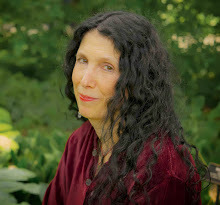 My l0th novel IS THIS TOMORROW (Algonquin Books) is a May Indie Pick! I’m also the New York Times bestselling author of PICTURES OF YOU (Algonquin), which sold to 6 countries, went into 5 printings, and was a San Francisco Chronicle Lit Pick, a Costco “Pennie’s Pick” and a NAIBA bestseller. Pictures of You is also a USA Today ebook bestseller and is on the Best Books of 2011 List from San Francisco Chronicle, Providence Journal, Kirkus Reviews and Bookmarks Magazine. It’s also one of Kirkus Reviews Top 5 books of 2011 about the Family and love. I’m the recipient of a New York Foundation of the Arts Grant in Fiction. I was a 2013 finalist in the Sundance Screenwriting Lab and a finalist in the Nickelodeon Screenwriting Fellowship, four of my novels were optioned for screen, and I talked my way into writing the script for two of them. My essay, HIgh Infidelity, has been optioned for film. I’m a book critic for The Boston Globe and People Magazine. I teach novel writing for UCLA and Stanford online, do private fiction editing, and I am a professional namer! I live with my husband and son. Visit me at http://www.carolineleavitt.com.
My l0th novel IS THIS TOMORROW (Algonquin Books) is a May Indie Pick! I’m also the New York Times bestselling author of PICTURES OF YOU (Algonquin), which sold to 6 countries, went into 5 printings, and was a San Francisco Chronicle Lit Pick, a Costco “Pennie’s Pick” and a NAIBA bestseller. Pictures of You is also a USA Today ebook bestseller and is on the Best Books of 2011 List from San Francisco Chronicle, Providence Journal, Kirkus Reviews and Bookmarks Magazine. It’s also one of Kirkus Reviews Top 5 books of 2011 about the Family and love. I’m the recipient of a New York Foundation of the Arts Grant in Fiction. I was a 2013 finalist in the Sundance Screenwriting Lab and a finalist in the Nickelodeon Screenwriting Fellowship, four of my novels were optioned for screen, and I talked my way into writing the script for two of them. My essay, HIgh Infidelity, has been optioned for film. I’m a book critic for The Boston Globe and People Magazine. I teach novel writing for UCLA and Stanford online, do private fiction editing, and I am a professional namer! I live with my husband and son. Visit me at http://www.carolineleavitt.com.


June 2, 2013
Back To Women’s Fiction Writers Business-As-Usual. Almost!
On Tuesday on WFW, I’ll start once again posting interviews and guest posts from some of your favorite and new-to-you women’s fiction authors. Oh yes, along with my own news and views on occasion (one perk of hosting this site).
But today I wanted to tell you about Printer’s Row Lit Fest in Chicago. It’s June 8-9 in the—you guessed it—Printer’s Row neighborhood. I’ll be on a panel on Sunday, June 9th at 3pm with Henriette Lazaridis Power and Thea Goodman, moderated by Parneshia Jones. You can find out more about Printers Row by clicking here. It’s all free, you just have to register for a ticket to attend!
In preparation for the Lit Fest, I was featured in the Chicago Tribune on Saturday and again in the Trib’s Printer’s Row Journal today.
 I have to say it’s very strange—yet I feel very fortunate to be included in the Tribune and to have THE GLASS WIVES celebrated so publicly.
I have to say it’s very strange—yet I feel very fortunate to be included in the Tribune and to have THE GLASS WIVES celebrated so publicly.
Something else going on that you may have caught wind of on Twitter or Facebook, is that I’ve signed another book deal with Brenda Copeland at St. Martin’s. Yep! I get to write another work of women’s fiction, FALLING INTO PLACE. This one is about Izzy Lane, a divorced mom and anonymous blogger whose lies about a wonderful (fake) boyfriend land her a job as a relationship columnist with a popular website. The problem is, she hasn’t dated in years. FALLING INTO PLACE explores not only the way one’s online life can intrude on real life, but why someone lives with ‘life lies’ and what has to happen to make her come clean and deal with the consequences. In Izzy’s case that’s not only her family and friends, but her readers.
And in addition to all the book hoopla, today is my daughter’s high school graduation and on Friday my son heads to New York for a summer internship. We are a very busy family!
I hope you’ll stick around for the next part of the writing and publishing journey and lots of new interviews with women’s fiction authors. WFW is scheduled through October 2013—but just let me know if you or someone you know should be included!
Thanks for everything!
Amy xo


May 25, 2013
Recipe For The Perfect Launch Party
When it was time to think about celebrating the arrival of The Glass Wives, I thought I didn’t want to have a party. Then I realized that you only have your first book come out ONCE (although author Melanie Benjamin tells me every launch feels like a debut). A fabulous friend generously offered to host a party for me at her home. I made a list of the people I wanted at the party. The list was short. Yes, her house could have accommodated a larger crowd, but I did not want to celebrate with a lot of people, only the people, for the most part, who were real friends and had be truly supportive through the process of writing and seeing my book through to publication. The people who were there before the book and would be there after the book. The people who would have been there if there were no book. And that’s what made it perfect for me. And for the first time in a long, I did allow it to be about me. Actually, most of my friends insisted upon it.
I knew were the right people to invite.
Amy xo
Recipe For The Perfect Launch Party
(as seen on The Debutante Ball)
First, you’ll need two packages of the best napkins on the planet.
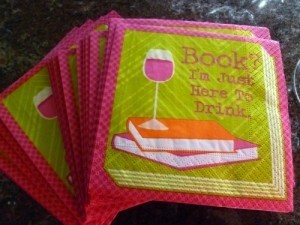
Then, you’ll want to find a wonderful friend and host.
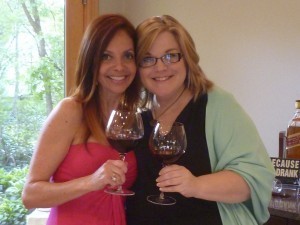
Slowly add her homemade tea cup candles to the table-scape.
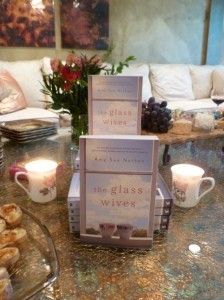
Then, add one BFF who flew in from 800 miles away.
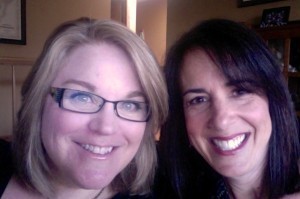
Mix in one critique partner you met online, but now count on in real life.
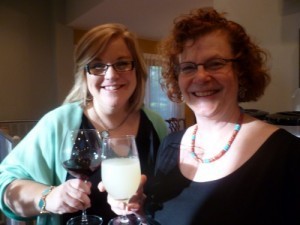
Stir in a huge stack of books to sign. Approximately thirty, or to taste.
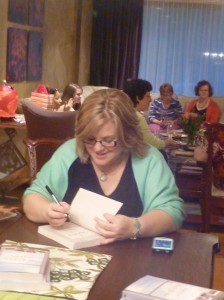
Sprinkle with great friends and one amazing daughter.
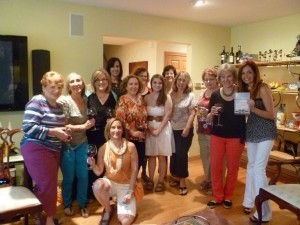
Top with wine and food (and rugelach favors tied with a bow) and enjoy!


May 22, 2013
Twelve Things I Learned My First Week As A Published Author
1. People you never expected to contact you will do so with kindness and enthusiasm, and sometimes with chocolate.
2. People you expected to contact you, will not.
3. Urgent Care Centers will be open in the middle of the night even when your book has launched just in case your 21-year-old cuts his finger on a broken glass at 1 am.
4. Photos will pour in from all over the country with sightings of the novel you wrote. Sometimes you won’t even know the people who snapped and sent the photo.
5. Someone will criticize your story and then say she read it in one day because she couldn’t put it down, making your head spin.
6. You will check Amazon rankings even though everyone has said the numbers don’t matter.
7. Amazon rankings will delight and/or destroy you (sometimes in the same hour) even though everyone has said that the numbers don’t matter.
8. Washing machines will leak. Because they can.
9. Sleep will elude you, except in the middle of the day.
10. Speaking to a group of high school creative writing students (daughter included) will be the highlight of the week.
11. You will receive many teacup gifts, and hope that your publisher puts jewelry on your next book cover (fingers crossed). Or a tropical island.
12. You will realize that this is the best job for you, just like you imagined.
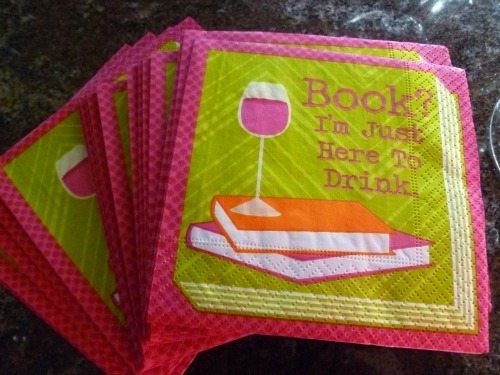
Best launch party napkin ever!


May 15, 2013
Turning The Tables At Women’s Fiction Writers: Author Eleanor Brown Interviews Amy Sue Nathan
Can you believe it? I’m here on my own blog being interviewed by New York Times best selling author, Eleanor Brown, in celebration of publication of THE GLASS WIVES (available everywhere books are sold)!
I met Eleanor in 2011 at the Printer’s Row Lit Fest in Chicago. Since that day—when I was a fan-girl extraordinaire (just ask my dear friend and critique partner, Pamela Toler)—Eleanor has been a cheerleader of mine. I’m so honored she took the time out of her crazy-busy schedule to ask me amazing, thoughtful questions. And of course, if you haven’t read her NYT bestselling novel, The Weird Sisters, you should.
NowI have to welcome myself to Women’s Fiction Writers, don’t I? And I thought this week couldn’t get any more spectacular!
I know there are many, many lurkers out there (hundreds and hundreds of you). I hope you’ll step out of the cyber shadows today and say hello!
Amy xo
Turning The Tables At Women’s Fiction Writers: Author Eleanor Brown Interviews Amy Sue Nathan (Me!)

Available everywhere books are sold! (FINALLY!)
Eleanor: The premise of The Glass Wives caught me right away – bringing together an ex-wife and a current wife. Where did the idea come from?
Amy: From realizing—with much relief and satisfaction—that things in my life were not as bad as they could be. I had divorced, my ex-husband had died, and there was this nagging sensation that as a family, things just couldn’t get much worse. My kids didn’t have a dad, our sense of family and place and normal were turned upside down, we were dealing with grief and the everyday lives of kids, because they do intertwine. And then at some point I just wanted to feel like IT COULD BE WORSE. I guess I was just trying to make myself feel better. The idea of having a woman in the same basic situation as me—a suburban divorced mom, but giving her a slew of things I didn’t have to deal with, like—a trophy-wife/widow and needing her to move in in order to pay the bills, not to mention some not-very-well-meaning neighbors, and a know-it-all sister. I ended up relieved I was not Evie Glass—and with the idea for my novel.
Eleanor: I am fascinated by names and the way they help form who we are. The last name of both women in your novel is ‘Glass’ – what is the importance of that name in the context of the story? Do their first names have equal importance?
Amy: I wanted a Jewish name for the family since Jewish culture plays an important part in the story. But, I didn’t want anything too “-This-stein” or “-That-gold” or “Generic-ishkiwitz,” so I settled on Glass. The fact that Glass also connect transparency and fragility, well, I’d like to say it was intentional but it was more like besert (meant to be).
Eleanor: Even if I’m not aware of it at the time, I find I am writing to answer unanswerable questions in my own life, and those become the themes of the novel. What are the questions you wrote The Glass Wives to answer?
Amy: That’s easy. I wrote The Glass Wives to figure out what makes a family, and why some kinds of family are frowned upon or treated differently than others. While suburban single-mom family might not make headline news, as a single-mom who’s steeped in a white picket community, I know that I’ve been treated differently than married moms. Everything here revolved around moms AND dads, or couples. I was always grateful my daughter’s school didn’t have a daddy-daughter dance, but my daughter’s Sunday School class did start a father-daughter project. In a class where there were only a handful of students, in a small Jewish community, I found it disrespectful and disheartening and totally not kosher. It’s hard to convince yourself and your kids that your family isn’t one with a missing part when something like that happens. I’m sure it won’t surprise you that I spoke up.  Writing the book reminded me to always view families without qualifiers or quantifiers and to be as inclusive as possible. Nobody’s perfect but we have to start somewhere.
Writing the book reminded me to always view families without qualifiers or quantifiers and to be as inclusive as possible. Nobody’s perfect but we have to start somewhere.
Eleanor: I absolutely love the cover of The Glass Wives – it’s so eye-catching and evocative. How did you and your publisher come to that design?
Amy: When I met my editor last summer, I was fortunate to also meet my cover designer. The only thing I was stuck on was that the cover be reflective of the content. I didn’t want the cover to mislead the reader. And, though I never mentioned having a window on the cover, it’s what I always imagined. And the cups are perfect—literally because there’s a lot of coffee drinking going on, and metaphorically because there are many similarities between the women, but they’re also different.
Eleanor: Your work on the Women’s Fiction Writers blog and your freelance career make you seem enviably organized – is that true? Does it extend to your fiction writing?
Amy: I’m a list maker. I have weekly lists, daily lists, morning lists, grocery lists. Lists of calls to make, interviews to write, emails to send, bills to pay, friends to make plan with. And when it comes to fiction writing, that’s on the list too. When I get into the writing, now that I have an outline to guide me, I guess it makes me comfortable because guess what? It looks like a list! I do list characters and things I want to accomplish in a scene. I figure the more I write my lists, the less I have to actually remember. As long as I remember where my lists are!
Eleanor: I spent the month leading up to my publication date waking up every night with terrible stomachaches from the anxiety. You’ve interviewed so many writers here on the Women’s Fiction Writers blog – does that mean you’re feeling confident about stepping into author-hood? What have you learned from the people you’ve interviewed?
Amy: I’m comfortable in the author community. How could I not be? I have found authors to be welcoming and generous and inclusive (and not care if I’m a single mom). But confident? Not really. The publishing world is so noisy today, that it takes a lot for a book to rise above that noise, and especially for a brand new author voice to be heard. I know that, and it worries me. The way I allay my own fears is to do everything I can possibly do to get the word out. And to do that, you guessed it, I make lists.
The authors I’ve interviewed have taught me many things—mostly that generosity is common among authors and that there is no one way to write a novel. Whether someone writes a book in three months, or ten years, uses an outline or dictates or writes everything long hand, we all have one thing in common. We are storytellers using written words. It connects us to each other and to our readers.
And authors have taught me another important lesson—to give back with gusto.
Eleanor: Are you part of a community of writers, formal or informal? What has that done for you?
Amy: Being part of writer groups has taught me more than I could have learned on my own. Ever. I’ve been a member of Backspace since 2007, and I was always taking online workshops which become temporary communities of their own. As a debut author I’m part of The Debutante Ball. The support of the other four “Debs” is fabulous. I’m part of a group of debut authors called Book Pregnant. More than anything it’s online author therapy without the couch or a bill. Some of those authors have become dear friends. I’m also active on Writer Unboxed Facebook Group and the new Women’s Fiction Writers Association. Add to all that the fact that this blog has taken on a life of its own and created a community as well.
Eleanor: Your editor, Brenda Copeland, is so lovely on Twitter, and has such incredible authors on her list. What’s it been like working with her?
Amy: Working with Brenda has taught me more about my own writing than anyone else. Making me the best writer I can be is what makes her a great editor. She makes me get under my own skin, if that makes sense. Brenda is also very funny (as I’m sure you’ve surmised) so amidst the formalities and editorial notes and deadlines, there have been a lot of laughs. Her confidence in me has been both humbling and motivating.
As has this interview, Eleanor. Thank you! xo
Now WFW readers, it’s your turn! Ask away!


Women's Fiction Writers
- Amy Sue Nathan's profile
- 543 followers



